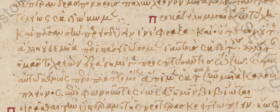Always the killjoy here at the forum ![]() ... I just made a post on the VS47 thread that the word "triumph-song" is not in the original manuscript... that's a "correction" by Usener. Feel free to continue the conversation over there:
... I just made a post on the VS47 thread that the word "triumph-song" is not in the original manuscript... that's a "correction" by Usener. Feel free to continue the conversation over there:
Thread
VS47 - Source in Vat.gr.1950 and elsewhere
This saying is attributed to Metrodorus.
Here is the manuscript of VS47

(Source: Vat.gr.1950, part 2, 403verso)
And here is the text in Metrodori Epicurei Fragmenta collegit scriptoris incerti Epicurei Commentarium moralem, subiecit Alfredus Koerte (p.561)

That famous word "triumph-song" does not appear in the manuscript! It is a "correction" by Usener, clearly shown in the manuscript itself and in Note (5) in Metrodori...: 5) πλειονος V[atican]., corr[ected by] Us[ener]. Usener…
Here is the manuscript of VS47
(Source: Vat.gr.1950, part 2, 403verso)
And here is the text in Metrodori Epicurei Fragmenta collegit scriptoris incerti Epicurei Commentarium moralem, subiecit Alfredus Koerte (p.561)
That famous word "triumph-song" does not appear in the manuscript! It is a "correction" by Usener, clearly shown in the manuscript itself and in Note (5) in Metrodori...: 5) πλειονος V[atican]., corr[ected by] Us[ener]. Usener…
Don

